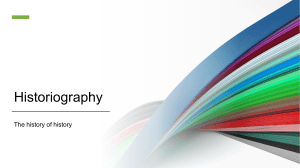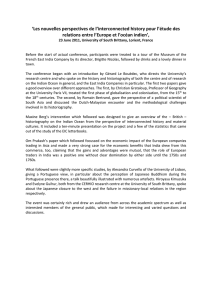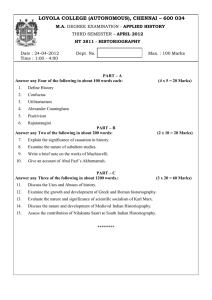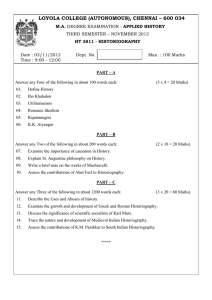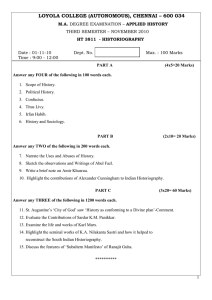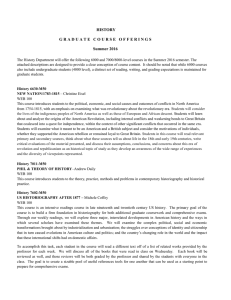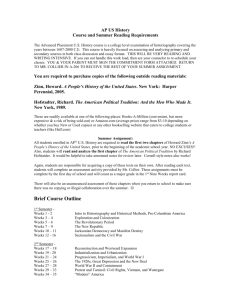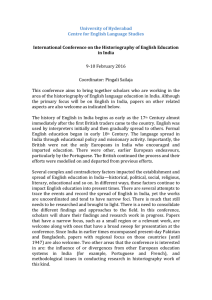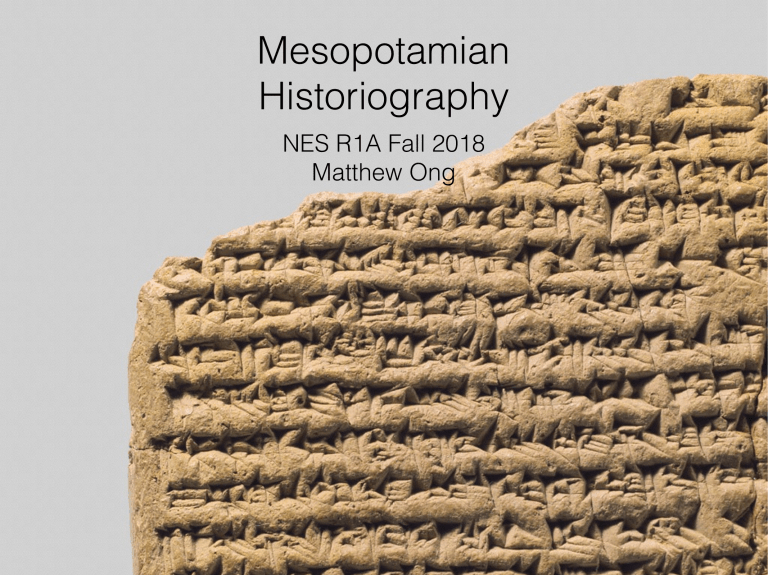
Mesopotamian Historiography NES R1A Fall 2018 Matthew Ong What is historical writing? • A record of things of the past? • • A collection of moral examples to live by? • • Plutarch’s Lives of the Noble Greeks and Romans A narrative put together by someone about the past? • • Old Testament, proceedings of the Senate Thucydides’ History of the Peloponnesian War A theory of how history works in general? • Hegel’s The Philosophy of History There is no single answer • The concept of history and writing about history (=historiography) is a highly culturally dependent phenomenon. Even restricting ourselves to the West, the concept has changed over time. History Antiquity Fixed frame of moral examples Middle Ages Prefiguring of God’s plan Historiography Biographies, exemplary stories Bible, biblical exegesis Early modern Dynamic process Philosophical Europe treatise Today Academic discipline Research article, book Why such variety? • Historiography is closely connected to the questions of realism, phenomenology of time, and narrativity. • If history is what 'really happened' in the past, this raises the question of what we consider to be real (realism), what we mean by the past (phenomenology of time), and how that reality is constituted in written/oral form (narrativity). • What is narrativity, and how does it relate to history? • Consider the following medieval Chinese 'tale': • There was a spirit that lived under the pavilion at Houguan District. At the end of every year, the functionaries of the district would slaughter an ox as an offering to it. But when Wu Zeng of Pei Commandery became the magistrate of the district, he ended this practice. After a year passed, Zeng was promoted to a military adjutant post. The spirit then came to him one night and asked, "Why do you not reinstate my meal?" His voice and appearance were quite hostile, and he reproached Zeng severely. The functionaries therefore brought a bull on the roadside and joined in making an apology. The spirit then departed. (Youming lu 208) • Should this be considered history or fiction? • Or consider some examples from Mesopotamia: • That month, a woman gave birth, and the baby’s head and hands were like those of a lion, his hips were like a frog’s. (Astronomical diary for 78 BCE) • If a woman gives birth and the baby has no right ear: the prince’s days will end. If a woman gives birth and the baby has no left ear: the prince’s days will be long. (Omens from Šumma izbu) • Also consider that historiography does not just include an account of what happened, but commentary on how to interpret what happened. • From the Gongyang zhuan (commentary to Spring and Autumn Annals), first year of Duke Yin: • The first year, spring, the king’s first month ( • ) What does yuannian mean? The first year of the ruler. What is meant by chun ? The first season of the year….Why does the text not say that the duke came to the vacant seat? To give full expression to the duke’s mind. In what way does it do so? The duke intended to bring the State to order, and then restore it to Huan. • We will see that our Western conceptual categories of literature, history, nature, and science do not have ready equivalents in Mesopotamia. Thus some basic aspects of representing the world are different. • Thus after taking this class, you will not only know more about Mesopotamian history per se, but also how the Mesopotamians as well as modern scholars, have thought about history. Class format • There will be a mixture of primary and secondary sources for reading. The primary sources are often short but may require close attention. Prompts will be provided to guide you in your reading. • There are about 11 main writing assignments centered on the reading. In addition there is a final essay and a few minor online assignments. A few quizzes on historical material will also be given out. • In addition to discussion the readings, we will also spend some time going over how to read efficiently and write college essays. Some rules • Laptops and other electronic devices should not be open during class (we may change this policy). • Beverages like water bottles allowed. Meals are not.
